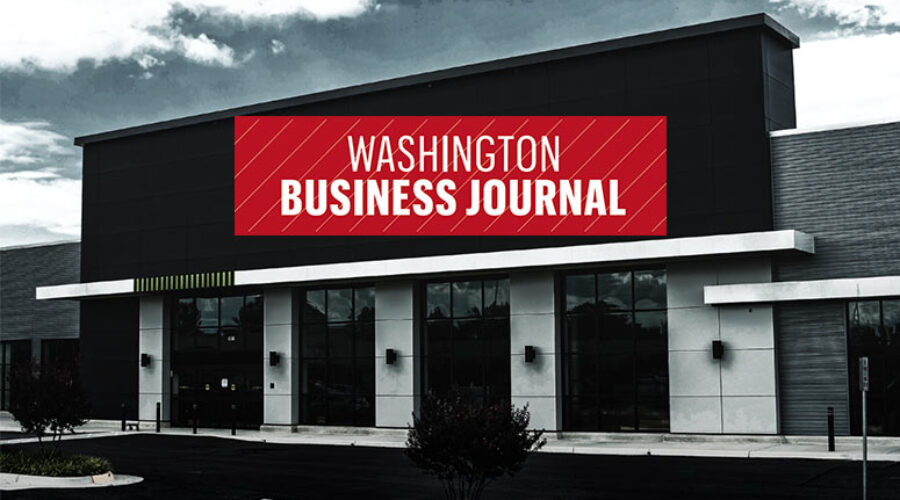Dark Space
Maybe you pass it on the way into the office. Or it’s across the street from your dry cleaner. Or it’s in the same shopping center as your favorite department store. How is that storefront still vacant? Isn’t anyone trying try to fill it?
In a growing number of cases across Greater Washington, the answer is no. Examples abound, like the former CVS Pharmacy near the corner of North Lynn Street and Wilson Boulevard in Rosslyn. It’s been closed for more than a year, but still no apparent effort to re-tenant the space. Then there’s the former Safeway at Crossroads Center in Baileys Crossroads, which was being converted into an Amazon Fresh when the e-commerce and cloud computing giant hit the brakes on its planned retail stores, and the Walmart at 77 H St. NW, which shuttered in March with a decade left on the retailer’s 83,700-square-foot lease.
The amount of empty retail space has spiked in recent years largely due to fallout from the Covid-19 pandemic and shifts in market dynamics. Once bustling neighborhood anchors have gone dark, leaving a hole in the community and some shoppers without options. But why some spaces remain vacant for prolonged periods of time while others turn over with greater haste might surprise you. There are times where the emptiness is quite purposeful — and there’s very little landlords can do.
Going dark
From North Lynn Street, you can peer straight through the empty, ground-floor retail space formerly occupied by CVS and into the main lobby of 1100 Wilson Blvd. The 31-story office building is part of The Towers office complex, which touts tenants including Raytheon, Sinclair Broadcast Group, the Washington Business Journal and the D.C.-area campus of the University of Virginia’s Darden School.
The pharmacy giant closed the store in April 2022 after more than two decades due to factors including the proximity of other CVS locations, such as one at the base of the Highlands multifamily development a few blocks west on Wilson Boulevard. Still, CVS is on the hook for rent through August 31, 2025, and its space isn’t being actively marketed to replacement tenants, per sources familiar with the situation.
Company spokesman Matt Blanchette said CVS routinely reviews its store footprint to ensure it has the right kinds of stores in the right locations for customers. He declined to comment further on that location or other recent CVS closures, of which there have been several in the D.C. area, and representatives for its landlord at 1100 Wilson Blvd., Monday Properties, declined to speak on behalf of CVS regarding its plans for the space.
It’s not uncommon for large, credit-worthy tenants like CVS to press for “go dark” provisions in their leases, giving them the cushion to close up to renovate or reposition their spaces as long as they meet other conditions, including keeping up with rent payments. Those kinds of anchors help to draw infill retailers, office tenants, apartment dwellers and paying customers, so landlords tend to be more willing to grant them additional concessions they wouldn’t grant smaller, mom-and-pop businesses like restaurants or boutique retail stores.
When their spaces go dark, that triggers a number of complications, including for other retail tenants that depended on the foot traffic from those stores, office tenants with expiring leases that might be more inclined move to other buildings with more engaging groundfloor retail, and struggling landlords. Monday Properties, for example, is in the midst of complex negotiations refinancing a portfolio of properties including 1100 Wilson Blvd., which was about 74% leased, per July loan serving data.
“An Amazon or a CVS, they may actually have their own forms that are tenant friendly, and they may have the ability to go dark for a period of time if they’ve got the leverage,” said James O’Brien, a real estate attorney in law firm Seyfarth Shaw LLP’s D.C. office. “Being dark in a multifamily building or a shopping center can be detrimental to a landlord because it makes the whole place look like a ghost town.”
There are recourses for landlords, including seeking to recapture the space, though a tenant can press to recoup what they spent building out their space or a percentage of their potential future sales in return. Other retail tenants in a shopping center might also have co-tenancy provisions entitling them to lower rent or even the right to terminate their leases in the event the property’s anchor tenant closes, provided they don’t wait too long to press those rights. Still, the rent check from shuttered tenants like CVS, Walmart and Amazon helps pay the bills, and O’Brien said he’s seen examples of landlords that will take no action against a shuttered but still rent-paying tenant.
For some, maintaining cash flow might be preferable to the costs involved in taking the space back, marketing and re-tenanting the space, per retail real estate expert Dave Dochter, of Dochter & Alexander Retail Advisors. That’s especially so if it’s in a market where vacancies are up and rental rates are down compared to where they stood when the lease got signed.
“An option for a landlord is to recapture space and re-let it to somebody else, but generally speaking, if you did those deals prior to the pandemic, you may not be incentivized to recapture or take that space back,” Dochter said. “It’s better for the building, it’s better for the retail environment, the amenity environment, so they oftentimes will want to do that, but it has to be a deal that’s going to be accretive and make sense.”
Read more of the Washington Business Journal original article >>




